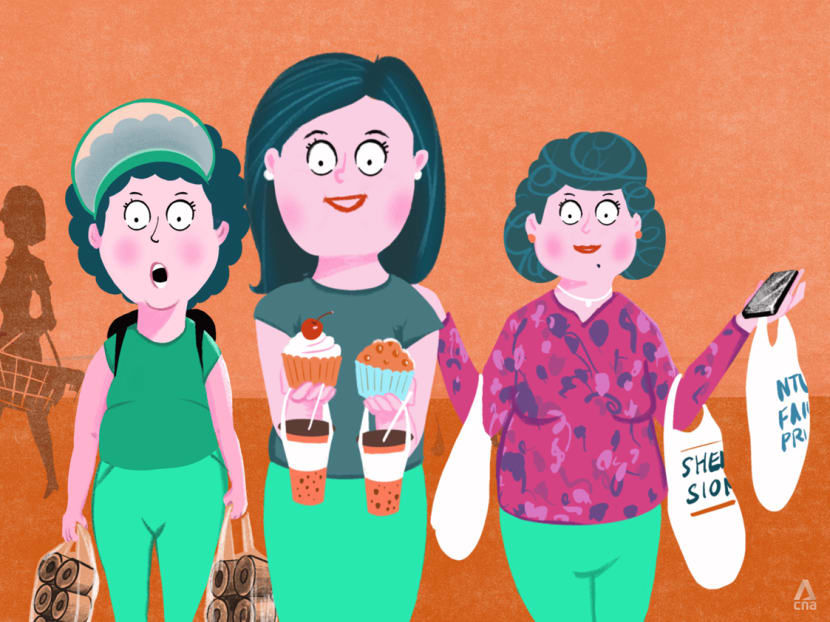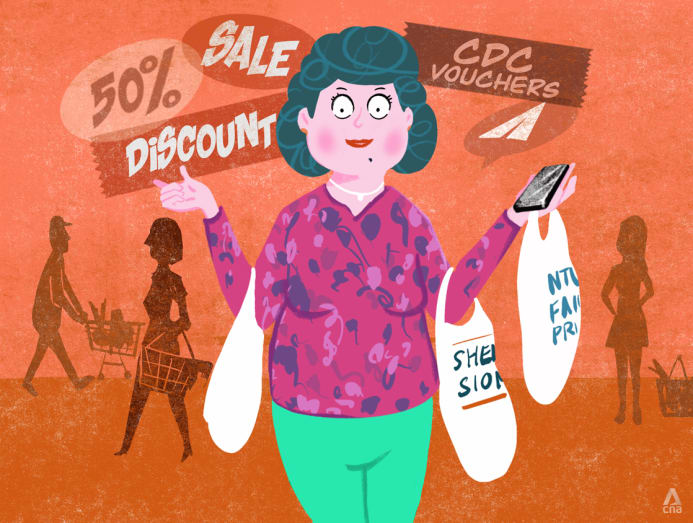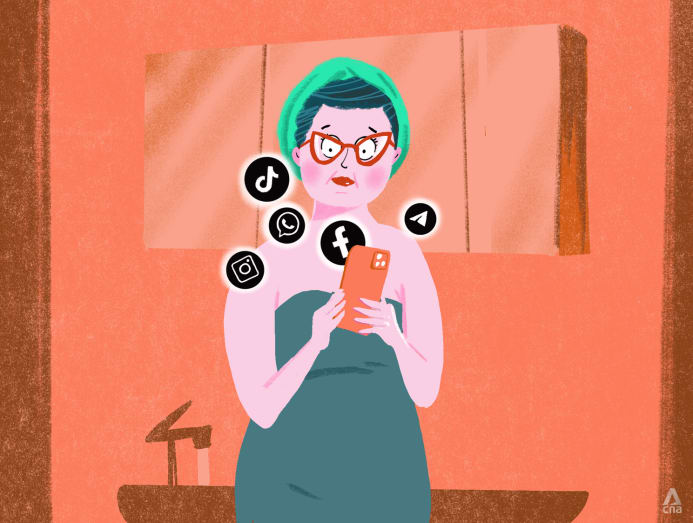‘There is one in all of us’: Could the Singaporean Aunty be our national treasure?
In the first of a light-hearted CNA Women series on the Singaporean Aunty, correspondent Hidayah Salamat finds out how an enduring stereotype has become an endearing archetype – and a national symbol.

(Art: Jasper Loh)
A few weeks ago, I decided to do the week’s grocery shopping at a supermarket in Eastpoint Mall. I happened to be in the area and this particular outlet was expansive and, I figured, well-stocked.
It was also “aunty” central.
I was staring at the halal cold cuts section without any intention of buying something from it (as you do when you’re browsing and listening to a podcast at the same time) when a woman spoke over my shoulder.
“This brand is not so good,” she said. Yet, she picked up a few packets of the beef bacon anyway and put them in her basket. I was intrigued.
“The brand I like is always out of stock,” she continued. “So I have to get whatever is available. I fry these up for my husband’s breakfast every Sunday.”
Then she pushed a packet into my hand and said: “You can still buy this one! Just add pepper when you’re cooking because this one is not spicy enough.
“Next time you can buy the correct brand.”
And that was how I ended up with a packet of beef bacon I did not want.

I can’t tell you how many times I’ve shopped under the influence of a stranger, simply because they appeared to have the authority of an “aunty”.
They were not all women, either.
I went to another supermarket chain with a male friend once and he insisted on going in the evening, when they apparently had the most stock of “reduced to clear” items and when, sometimes, you could get the day’s bread at half price.
“It’s very ‘aunty’, I know,” he said. “But good deal, must take.”
WHAT IS A SINGAPOREAN AUNTY?
An aunt or aunty is, by simple definition, an older female relative; more specifically, the sister of a parent.
In Singapore, the concept is more nuanced.
As a millennial Singaporean, my understanding of the “Singaporean aunty” is that it’s a caricature of the middle-aged Singaporean woman; a stereotype and largely, an affront.
Lately though, I’ve noticed it being accepted as a wry compliment.
I turned to sociologist Dr Atiqah Azhari, who lectures at the Singapore University of Social Sciences, for a more intellectual perspective on the phenomenon.
You can always tell who are the ‘aunties’ in a social setting because they are always busy making sure everyone has eaten.
“One of the hallmarks of a Singaporean aunty is her vibrantly assertive attitude – she speaks her mind with confidence. Yet she doesn’t come across as overbearing. She’s typically kind, amiable and sociable.
“The Singaporean aunty is also characterised by her prudent and resourceful nature. She knows where to purchase everyday items at discounted prices and is financially savvy.
“She’s the kind of person who would ask you to buy something from the shop down the road because it is cheaper there,” she told me.
A glowing testimonial, further validated by the success of Makcik Alert, a deal-touting social media platform that has attracted more than 20,000 followers on Instagram, thanks to its founders boasting all the aforementioned characteristics.
The account is also full of sisterly barbs and droll humour – another hallmark, I observed, of the aunty archetype.
It all started with a WhatsApp hive in 2019. As with many families, the three sisters, Aldila Mustapha, Sophiela Mustapha and Noorhayati Mustapha, had been part of a WhatsApp chat group that soon became inundated with Noorhayati’s deal alerts.
“She would spot promotions whenever she was out and about, and share them with us. I couldn’t keep up, so I suggested we create an Instagram account,” said Aldila, who is the eldest at 54.
To the sisters, the traits of a Singaporean aunty are universal.
“They are not gender or age-specific, and you can possess them regardless of where you are from,” said Sophiela, an engineer who is also in her 50s.
Traits like knowing a good bargain, knowing how to bargain, being confident to the point of being cocksure and the tendency to give unsolicited advice simply represent “an awareness of how things work in the world and how to get them to work for you”, she said.
But nothing is perfect – not even an icon – and the Singaporean aunty also has a perceived bad side.
“Although the phrase is typically used in an endearing and respectful way that celebrates positive traits like confidence, resourcefulness and sociability, an excessive display of these traits may also garner derogatory connotations,” said Dr Atiqah.
“For instance, a woman who is disproportionately frugal may be called an ‘aunty’ in a way that conveys negative undertones of being too calculative,” she added.
Dr Atiqah also observed “aunty” being used as a negative label when appraising someone’s fashion sense.
“As the notion of the Singaporean aunty originally refers to older women, calling someone ‘aunty’ with respect to her fashion sense suggests she wears outdated and gaudy clothing,” she said.
Despite fashioning themselves as the Malay equivalent of “aunties”, the Makcik Alert sisters also had a lot to say about the less favourable aspects of the archetype.
“They like to insist that people follow their way and they always must know what’s happening around them,” said Sophiela.
“They always think they know everything,” Noorhayati added.
But there are derogatory associations the sisters think are misconceptions, which they attempt to debunk on their platform.
For example, the idea that a Singaporean aunty has to look a certain way.
She doesn’t always have to wear gaudy clothing for example, said Sophiela.
Makciks know how to use gadgets – they don’t want to lose out to newer generations.
“There are some aunties you can ‘spot’ just based on their physical appearances, but there are some hidden in plain sight. You can always tell who are the ‘aunties’ in a social setting because they are always busy making sure everyone has eaten,” she said.
A second misconception, the women pointed out, is that “aunties” cannot keep up with the times.
“Makciks now are highly educated,” said Aldila. “You’re never too old to learn anything. At 50, myself and two other makciks took our diploma in retail.
“Makciks know how to use gadgets – they don’t want to lose out to newer generations.”
UNIQUELY SINGAPOREAN
I asked Dr Atiqah if she could pinpoint the origin of the Singaporean aunty archetype.
The concept can probably be traced back to the early years of Singapore’s independence, she said.
“In the 1960s and 1970s, as Singapore began to establish itself as a city-state, older women formed an important part of our economy and society. These women were resourceful and diligent in their humble work, and played an integral role in galvanising the community together,” she said.
“As Singapore progressed into a modern city, the social landscape of our society might have shifted but the distinctive traits of our foremothers have become so ingrained in our society that they have probably evolved and were retained as traits that we associate with the Singaporean aunty today,” she added.
In its nearly 60 years of independence, many words have been associated with Singapore. It’s been described as modern, contemporary, futuristic and even avant garde. So it’s remarkable that something so abstract can turn out to be such a classic.
Dr Atiqah said the idea of the Singaporean aunty has endured all this time because of its “strong cultural relevance”.
“Concepts like these connote cultural values that people relate to and that are deeply ingrained in our society. Qualities like resourcefulness and frugality resonate with most Singaporeans.
“So does the distinctively sociable trait of the aunty – it embodies the importance of maintaining robust familial relationships and a strong community spirit, which is a cultural value upheld in Singapore’s largely collectivistic culture,” she suggested.

Dr Atiqah likens the Singaporean aunty to “kiasuism”. The word “kiasu”, derived from the Hokkien dialect, means “fear of losing”, a concept Dr Atiqah said “encompasses our competitive spirit and strong desire to succeed”.
Like the aunty, it is an idea “relatable to Singaporeans across all ages” and one that holds value due to how deeply it resonates with people’s lives,” she said.
A NATIONAL TREASURE?
As a country with such a young heritage, we don’t often refer to something or someone as a national treasure.
Perhaps, the Singaporean aunty – intangible though as it is – should be considered.
For one, it is timeless.
“Ideas like the Singaporean aunty might have originated from our past but they continue to be prevalent today, which reflects their ability to evolve with the changing social landscape and attests to their continued significance in the future,” said Dr Atiqah.
By catalysing the “kampung spirit”, the Aunty also strengthens social networks and enhances psychological resilience, contributing to nation-building, she added.
Perhaps the biggest reason the Singaporean aunty is a treasure to be protected is because, well, she is us.
As Noorhayati plainly put it: “There is one in all of us. Who doesn’t like discounts? Who doesn’t gossip? Who doesn’t try and ‘chope’ seats when it’s crowded? Who doesn’t want to cut corners and save time?”
CNA Women is a section on CNA Lifestyle that seeks to inform, empower and inspire the modern woman. If you have women-related news, issues and ideas to share with us, email CNAWomen [at] mediacorp.com.sg (CNAWomen[at]mediacorp[dot]com[dot]sg).









